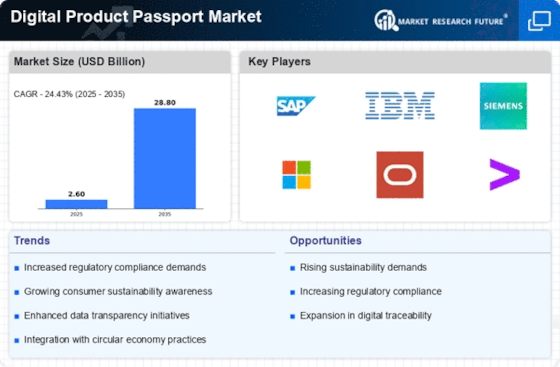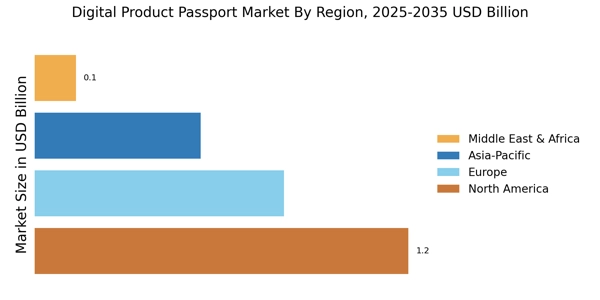Advancements in Technology
Technological advancements are playing a pivotal role in shaping the Digital Product Passport Market. Innovations in blockchain, IoT, and data analytics are enabling the creation of more robust and secure digital product passports. These technologies facilitate real-time tracking and verification of product information, enhancing the reliability of the data provided to consumers and regulators. As businesses increasingly leverage these technologies, the market is expected to witness significant growth. By 2025, the integration of advanced technologies into digital product passports could lead to a more streamlined and efficient supply chain, further driving market expansion.
Sustainability Initiatives
The growing emphasis on sustainability is a key driver for the Digital Product Passport Market. Companies are increasingly adopting sustainable practices, and digital product passports serve as a tool to communicate these efforts effectively. By providing detailed information about a product's environmental impact and recyclability, businesses can appeal to eco-conscious consumers. This trend is particularly relevant in industries such as packaging and consumer goods, where sustainability is becoming a competitive differentiator. The market is likely to grow as more companies recognize the value of digital product passports in promoting their sustainability initiatives.
Increased Regulatory Compliance
The Digital Product Passport Market is experiencing a surge in demand due to heightened regulatory compliance requirements. Governments and regulatory bodies are increasingly mandating transparency in product information, particularly concerning sustainability and safety. This trend is evident in various sectors, including electronics and textiles, where regulations necessitate detailed product data. As a result, companies are compelled to adopt digital product passports to ensure compliance and avoid penalties. The market is projected to grow as businesses recognize the necessity of integrating these passports into their supply chains. By 2025, the market for digital product passports is expected to reach substantial figures, driven by the need for adherence to evolving regulations.
Consumer Demand for Transparency
Consumer preferences are shifting towards transparency, significantly impacting the Digital Product Passport Market. Today's consumers are increasingly aware of the environmental and social implications of their purchases. They demand detailed information about product origins, materials, and lifecycle impacts. This trend is particularly pronounced in sectors such as food and fashion, where ethical sourcing and sustainability are paramount. Companies that provide digital product passports can cater to this demand, enhancing brand loyalty and consumer trust. As a result, the market is likely to expand, with estimates suggesting a notable increase in adoption rates among businesses aiming to meet consumer expectations.
Global Supply Chain Optimization
The need for supply chain optimization is driving the Digital Product Passport Market. As businesses seek to enhance efficiency and reduce costs, digital product passports offer a solution by providing comprehensive product information throughout the supply chain. This transparency allows for better inventory management, reduced waste, and improved logistics. Companies that implement digital product passports can streamline their operations, leading to increased profitability. The market is expected to expand as more organizations recognize the potential of digital product passports to optimize their supply chains and improve overall operational performance.

















